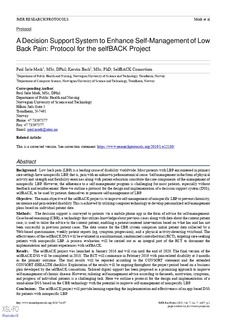| dc.contributor.author | Mork, Paul Jarle | |
| dc.contributor.author | Bach, Kerstin | |
| dc.date.accessioned | 2019-03-29T09:48:01Z | |
| dc.date.available | 2019-03-29T09:48:01Z | |
| dc.date.created | 2018-10-02T14:49:17Z | |
| dc.date.issued | 2018 | |
| dc.identifier.citation | Journal of Medical Internet Research. 2018, 7 (7), . | nb_NO |
| dc.identifier.issn | 1438-8871 | |
| dc.identifier.uri | http://hdl.handle.net/11250/2592407 | |
| dc.description.abstract | Background: Low back pain (LBP) is a leading cause of disability worldwide. Most patients with LBP encountered in primary care settings have nonspecific LBP, that is, pain with an unknown pathoanatomical cause. Self-management in the form of physical activity and strength and flexibility exercises along with patient education constitute the core components of the management of nonspecific LBP. However, the adherence to a self-management program is challenging for most patients, especially without feedback and reinforcement. Here we outline a protocol for the design and implementation of a decision support system (DSS), selfBACK, to be used by patients themselves to promote self-management of LBP.
Objective: The main objective of the selfBACK project is to improve self-management of nonspecific LBP to prevent chronicity, recurrence and pain-related disability. This is achieved by utilizing computer technology to develop personalized self-management plans based on individual patient data.
Methods: The decision support is conveyed to patients via a mobile phone app in the form of advice for self-management. Case-based reasoning (CBR), a technology that utilizes knowledge about previous cases along with data about the current patient case, is used to tailor the advice to the current patient, enabling a patient-centered intervention based on what has and has not been successful in previous patient cases. The data source for the CBR system comprises initial patient data collected by a Web-based questionnaire, weekly patient reports (eg, symptom progression), and a physical activity-detecting wristband. The effectiveness of the selfBACK DSS will be evaluated in a multinational, randomized controlled trial (RCT), targeting care-seeking patients with nonspecific LBP. A process evaluation will be carried out as an integral part of the RCT to document the implementation and patient experiences with selfBACK.
Results: The selfBACK project was launched in January 2016 and will run until the end of 2020. The final version of the selfBACK DSS will be completed in 2018. The RCT will commence in February 2019 with pain-related disability at 3 months as the primary outcome. The trial results will be reported according to the CONSORT statement and the extended CONSORT-EHEALTH checklist. Exploitation of the results will be ongoing throughout the project period based on a business plan developed by the selfBACK consortium. Tailored digital support has been proposed as a promising approach to improve self-management of chronic disease. However, tailoring self-management advice according to the needs, motivation, symptoms, and progress of individual patients is a challenging task. Here we outline a protocol for the design and implementation of a stand-alone DSS based on the CBR technology with the potential to improve self-management of nonspecific LBP.
Conclusions: The selfBACK project will provide learning regarding the implementation and effectiveness of an app-based DSS for patients with nonspecific LBP. | nb_NO |
| dc.language.iso | eng | nb_NO |
| dc.publisher | JMIR Publications | nb_NO |
| dc.relation.uri | https://www.researchprotocols.org/2018/7/e167/ | |
| dc.rights | Navngivelse 4.0 Internasjonal | * |
| dc.rights.uri | http://creativecommons.org/licenses/by/4.0/deed.no | * |
| dc.title | A Decision Support System to Enhance Self-Management of Low Back Pain: Protocol for the selfBACK Project | nb_NO |
| dc.type | Journal article | nb_NO |
| dc.type | Peer reviewed | nb_NO |
| dc.description.version | publishedVersion | nb_NO |
| dc.source.pagenumber | 13 | nb_NO |
| dc.source.volume | 7 | nb_NO |
| dc.source.journal | Journal of Medical Internet Research | nb_NO |
| dc.source.issue | 7 | nb_NO |
| dc.identifier.doi | 10.2196/resprot.9379 | |
| dc.identifier.cristin | 1617258 | |
| dc.relation.project | EC/H2020/689043 | nb_NO |
| dc.description.localcode | © Paul Jarle Mork, Kerstin Bach. Originally published in JMIR Research Protocols (http://www.researchprotocols.org), 20.07.2018. This is an open-access article distributed under the terms of the Creative Commons Attribution License (https://creativecommons.org/licenses/by/4.0/), which permits unrestricted use, distribution, and reproduction in any medium, provided the original work, first published in JMIR Research Protocols, is properly cited. The complete bibliographic information, a link to the original publication on http://www.researchprotocols.org, as well as this copyright and license information must be included. | nb_NO |
| cristin.unitcode | 194,65,20,0 | |
| cristin.unitcode | 194,63,10,0 | |
| cristin.unitname | Institutt for samfunnsmedisin og sykepleie | |
| cristin.unitname | Institutt for datateknologi og informatikk | |
| cristin.ispublished | true | |
| cristin.fulltext | original | |
| cristin.qualitycode | 2 | |

